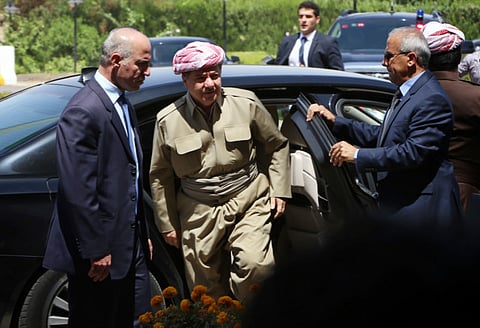A Kurdish pipe dream that may come true
Kurdish politicians now aim to make the city the capital of their future state

The pipe dream may actually come true. It is inching closer to reality now, much more so than ever before. The Kurds may finally have their own state, carved out of northern Iraq. Just when everyone thought the age of nation states belonged to a long-gone era — what with building of regional blocs and global alliances — the pernicious head of nationalism and parochialism is once again emerging.
The President of the Kurdish Regional Government (KRG), Masoud Barzani, is no longer mincing his words. He wants to lead the autonomous Kurdistan region to full independence and has instructed the Kurdish parliament to start preparations through an electoral committee for holding a popular referendum on the issue. This is likely to happen in the next couple of months, he said. So far, he is rejecting the view of the government in Baghdad that such a referendum will be unconstitutional and downright illegal. Barzani is taking no heed, stating that the central government has not lived up to its promises of granting them the disputed territory and owes the KRG $6 billion (Dh22 billion) in arrears. This is in addition to his claim that the central government is in total disarray, with Iraqi politicians still bickering, after April’s parliamentary elections, about which ministerial seats should be given to Shiite, Sunni and Kurdish parliamentary deputies. This is creating a deep malaise and a government that cannot function under Nouri Al Maliki, who is positioning himself for a third term as prime minister. Despite calls for him to step down, he is holding on to his seat by the skin of his teeth.
On Wednesday, Al Maliki accused the Kurds of harbouring jihadists. Yesterday, the Kurds accused him of being “hysterical” and not fit to run the country.
Barzani’s courageous move for Kurdish independence has its roots partly in the fact that the Iraqi government troops can no longer control their northern territory. There are pitched battles with fighters from the Islamic State of Iraq and the Levant (Isil). Last month alone, 2,400 people were killed, including nearly 900 security personnel, according to the United Nations. This has created a power vacuum in these areas that has sent regular troops scurrying for their lives.
The Kurds have long argued that their Peshmerga forces have been stationed in these areas to prevent further Isil consolidation since the latter has already established a so-called Islamic caliphate in the territory it controls, stretching from Syria to northern Iraq. It may be argued that the Kurds arrived at this juncture because of the “developing situation and mayhem”, something that made them bolder in their demands and even opportunistic, as Al Maliki implied. The Iraqi prime minister said: “No one has the right to exploit the events that took place to impose a fait accompli.” But that maybe bluster from a desperate man who can no longer control the rest of the nation. Nationalistic aspirations rose higher when Peshmerga troops seized oil-rich Kirkuk, which was itself a scene of battles between Isil fighters and regular soldiers who left the area hastily after June 10, when clashes between the two sides became bloodier.
Kirkuk is considered the jewel in the crown, given its economic value. Kurdish politicians now aim to make the city the capital of their future state; the city would make their economy more stable and prosperous. However, even if their call for self-determination and statehood does bear fruit, there are plenty of countries that are opposed to such an entity and may try their hardest to quash it. Iran, Syria and Turkey — are all neighbouring countries with Kurdish populations in the millions. The estimated 30-40 million Kurds, including those from the Caucasus, are expecting, at the very worst, an uprising.
Iraq is the only country that granted their Kurdish minority — about six million or 20 per cent of the population — autonomy in the 1990s while the remaining countries, especially Turkey, have refused to do so, and even imposed stringent rules against them. The argument goes that if Iraqi Kurds are granted a state, other Kurdish populations will clamour for political rights and reforms.
Surprisingly, Israel is one of the few countries that came out in support of the Kurdish move for independence while the US, on the surface at least, appealed for the continuation of a single, united Iraq, fearing the country would disintegrate if a new Kurdish state is created. However, many argue, including the Kurds themselves, that Iraq is already disintegrating and a total break-up is only a matter of time.
There are also concerns that a new Kurdish state will not be fully economically viable because of the fact that it will be landlocked, subject to the whims of its neighbours. A case in point is the newly-established oil pipeline through Turkey, which Baghdad is angry about. But it is argued that Turkey can just as easily turn the tap off, if the Ankara government becomes upset with the Kurdish state.
But despite all this, the odds are that the Kurds will establish their own state, come what may. The Kurdish leadership sees this as a golden opportunity, one that may not come in a long, long time, and one that is not to be wasted despite the ramifications it may have for the future disintegration of Iraq. A Kurdish state is in the offing.
Marwan Asmar is a commentator based in Amman. He has worked in journalism for many years and has a PhD in political science from Leeds University in the UK.


